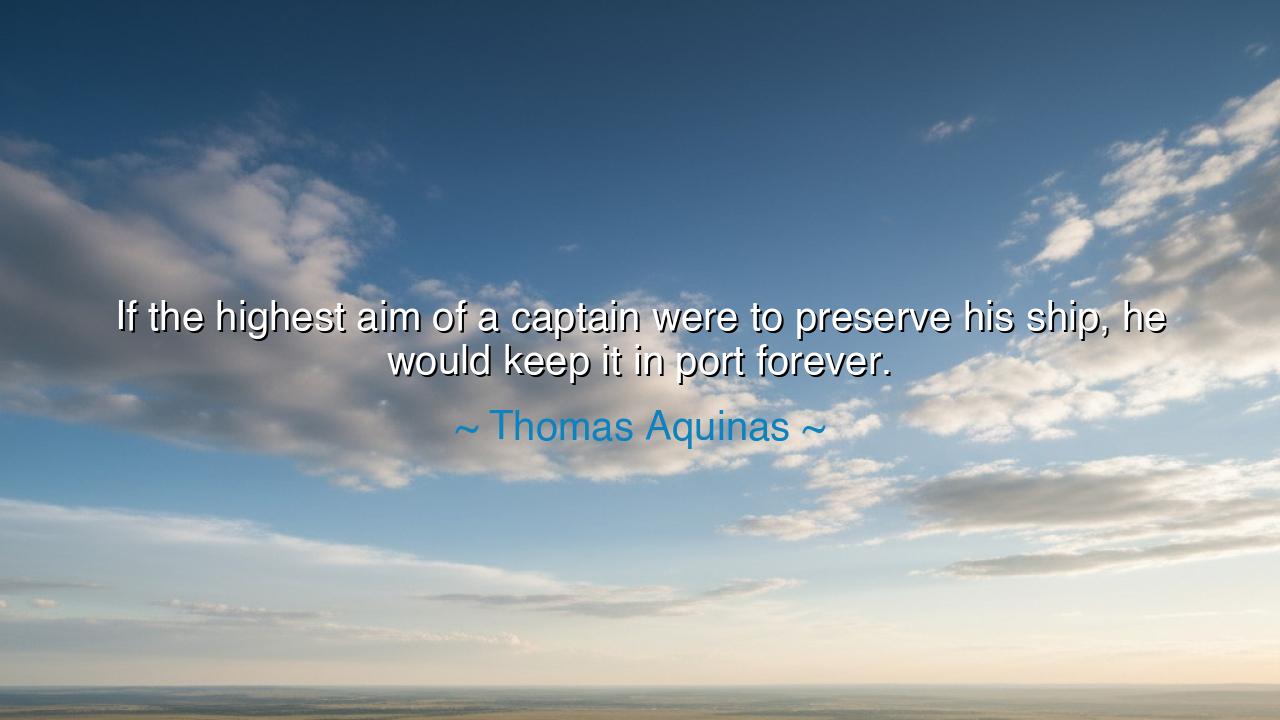
If the highest aim of a captain were to preserve his ship, he
If the highest aim of a captain were to preserve his ship, he would keep it in port forever.






The words of Thomas Aquinas, “If the highest aim of a captain were to preserve his ship, he would keep it in port forever,” cut through the ages like the cry of a prophet. In this simple image of a ship and its captain, Aquinas unveils the eternal truth that safety alone is not the purpose of life. A vessel is not built to rest idly in the harbor, gleaming yet unused, but to carry men and goods across perilous seas, to endure storms, and to reach distant shores. So too with human beings: we are not placed upon this earth merely to avoid harm, but to dare, to strive, to fulfill the purposes for which we were created. Preservation is not the highest aim—fulfillment is.
The ancients knew this well. The Greeks told tales of Odysseus, who did not cling to safety but braved ten years of wandering to return home. The Romans built their empire by venturing beyond the familiar into wild lands and turbulent seas. They understood that greatness comes not from harboring in safety but from embracing the risk of voyage. Aquinas, steeped in both theology and philosophy, gave voice to this wisdom in words that remind us that purpose must always outweigh fear.
Consider Christopher Columbus. If his only goal had been to preserve his ships, the Niña, the Pinta, and the Santa María would have remained at anchor, safe from storms and mutiny. But they would never have crossed the ocean, never have touched the shores of the New World, never have changed the course of history. His voyage was fraught with peril, and indeed, some of his ships were lost—but his vision was fulfilled. His life exemplified Aquinas’ truth: safety without risk is stagnation, but risk embraced for a greater end leads to transformation.
History also warns us of the opposite. Many rulers clung to preservation above all else, locking their treasures in fortresses, guarding their thrones with fear, and refusing the dangers of progress. Such men may have prolonged their reigns, but they left no legacy of greatness. Their ships remained in port, intact but irrelevant. The world remembers not the captains who hid in the harbor, but those who dared the open sea.
The meaning of Aquinas’ words is both fierce and liberating. Fierce, because they condemn the cowardice that clings to safety at the cost of purpose. Liberating, because they release us from the illusion that failure or loss is the ultimate evil. Far worse is to never attempt the voyage, to leave our gifts unused, our visions untried. The ship was made for the sea; the soul was made for destiny. To withhold ourselves in fear is to betray our very design.
The lesson for us is clear: do not live your life as though the highest aim were simply to avoid harm, to keep the body comfortable, to guard against every risk. Rather, ask: what was I made for? What seas must I cross? What storms must I endure to fulfill my true calling? If you live only for safety, your life will be preserved but empty. If you live for purpose, you may suffer storms, but you will leave behind a legacy of meaning.
The practical action is this: examine your choices and ask whether they are driven by preservation or by purpose. Take risks that serve your higher calling—risks in work, in love, in service to others. Step beyond the harbor of fear into the ocean of possibility. Accept that storms will come, but know also that only by venturing forth can you reach the horizon that calls to you.
Therefore, O listener, engrave upon your soul the wisdom of Aquinas: “If the highest aim of a captain were to preserve his ship, he would keep it in port forever.” Do not keep your ship idle. Do not keep your soul chained in the harbor of safety. Sail forth, embrace the storm, and in doing so, fulfill the very purpose for which you were made.






AAdministratorAdministrator
Welcome, honored guests. Please leave a comment, we will respond soon